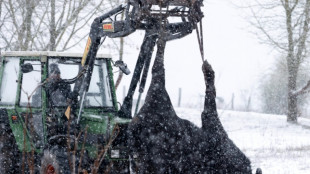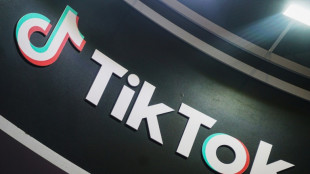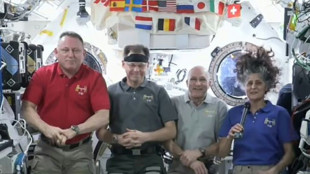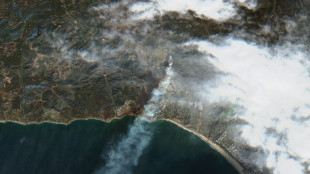
-
 Malala Yousafzai 'overwhelmed and happy' to be back in Pakistan
Malala Yousafzai 'overwhelmed and happy' to be back in Pakistan
-
'Education apartheid': schooling in crisis in Pakistan

-
 Smart glasses enter new era with sleeker designs, lower prices
Smart glasses enter new era with sleeker designs, lower prices
-
Supreme Court looks poised to uphold TikTok ban

-
 2024 hottest recorded year, crossed global warming limit
2024 hottest recorded year, crossed global warming limit
-
Germany reports foot-and-mouth disease in water buffalo

-
 US hikes reward for Maduro arrest after 'illegitimate' swearing-in
US hikes reward for Maduro arrest after 'illegitimate' swearing-in
-
Robots set to move beyond factory as AI advances

-
 Pro-Russian disinformation makes its Bluesky debut
Pro-Russian disinformation makes its Bluesky debut
-
UK gas reserves 'concerningly low', warns biggest supplier

-
 2024 warmest year on record for mainland US: agency
2024 warmest year on record for mainland US: agency
-
Meta policy reversal puts question mark on future of fact-checking

-
 Meta policy reversal puts question mark on furure of fact-checking
Meta policy reversal puts question mark on furure of fact-checking
-
Strong US jobs report sends stocks sliding, dollar rising

-
 US hiring beats expectations in December to cap solid year
US hiring beats expectations in December to cap solid year
-
UK gas reserves 'concerningly low': Biggest supplier

-
 Global stocks mostly fall before US jobs data
Global stocks mostly fall before US jobs data
-
Ubisoft: the 'Assassin's Creed' maker targeted by suitors

-
 Stock markets drift lower as US jobs data looms
Stock markets drift lower as US jobs data looms
-
Pakistan flight departs for Paris after EU ban lifted

-
 Nobel laureate Malala Yousafzai to visit native Pakistan for girls' summit
Nobel laureate Malala Yousafzai to visit native Pakistan for girls' summit
-
AI comes down from the cloud as chips get smarter

-
 Tajikistan bets on giant dam to solve electricity crisis
Tajikistan bets on giant dam to solve electricity crisis
-
Uruguay bucks 2024 global warming trend

-
 Last 2 years crossed 1.5C global warming limit: EU monitor
Last 2 years crossed 1.5C global warming limit: EU monitor
-
Japan 'poop master' gives back to nature

-
 US Supreme Court to hear TikTok ban case
US Supreme Court to hear TikTok ban case
-
US Fed's December rate cut should be its last for now: official

-
 Paris Hilton among celebrities to lose homes in LA fires
Paris Hilton among celebrities to lose homes in LA fires
-
Airbus boosts plane deliveries in 2024

-
 Ubisoft reviews restructuring options, postpones new Assassin's Creed
Ubisoft reviews restructuring options, postpones new Assassin's Creed
-
Lamborghini sets new sales record amidst hybrid push

-
 Lebanon army chief Aoun becomes president after two-year vacancy
Lebanon army chief Aoun becomes president after two-year vacancy
-
US emissions stagnated in 2024, challenging climate goals: study

-
 Lebanon army chief short of required majority in first round of president vote
Lebanon army chief short of required majority in first round of president vote
-
Global stock markets mixed tracking US rates outlook

-
 Lebanon meets to finally elect president after two-year vacancy
Lebanon meets to finally elect president after two-year vacancy
-
Celebrities flee Los Angeles fires, lose houses as Hollywood events scrapped

-
 Japan startup hopeful ahead of second moon launch
Japan startup hopeful ahead of second moon launch
-
Ukraine allies to hold last defence meet before Trump takes office

-
 Myanmar military adopts anti-junta fighters' drone tactics
Myanmar military adopts anti-junta fighters' drone tactics
-
CES tech looks to help world's aging population

-
 Rubber tappers forge sustainable future in Amazon
Rubber tappers forge sustainable future in Amazon
-
US astronauts upbeat seven months into eight-day mission

-
 Extreme weather, suburban sprawl fuel LA's wildfires
Extreme weather, suburban sprawl fuel LA's wildfires
-
Political chess or true beliefs? Zuckerberg's surprise Trump pivot

-
 US Fed officials concerned over 'stalled' disinflation, tariffs: minutes
US Fed officials concerned over 'stalled' disinflation, tariffs: minutes
-
Celebrities flee Los Angeles fires as Hollywood events scrapped

-
 Several US Fed officials concerned over 'stalled' disinflation: minutes
Several US Fed officials concerned over 'stalled' disinflation: minutes
-
US tech titans ramp up pressure on EU

| BCC | -1.31% | 115.88 | $ | |
| RBGPF | 100% | 60.49 | $ | |
| SCS | -3.01% | 10.97 | $ | |
| NGG | -3.3% | 56.13 | $ | |
| AZN | 0.64% | 67.01 | $ | |
| BTI | -2.34% | 35.9 | $ | |
| GSK | -1.99% | 33.09 | $ | |
| RIO | 0.36% | 58.84 | $ | |
| CMSC | -0.79% | 22.92 | $ | |
| BP | 0.54% | 31.29 | $ | |
| RELX | -0.86% | 46.37 | $ | |
| BCE | -2.92% | 22.96 | $ | |
| RYCEF | -0.42% | 7.07 | $ | |
| JRI | -1.16% | 12.08 | $ | |
| CMSD | -0.65% | 23.25 | $ | |
| VOD | -1.99% | 8.05 | $ |

America is finally cleaning up its abandoned, leaking oil wells
Bill Suan bought his family's cattle farm in the mountains of West Virginia a decade-and-a-half ago with little thought for the two gas wells drilled on the property -- but then they started leaking oil onto his fields and sickening his cows.
After taking the operator to court, Suan was successful in plugging one well, but the company has since disappeared, leaving him to contend with a small-scale environmental disaster that's a symptom of the larger problem of orphaned oil wells across the United States.
"It's shocking to think that it was like that for decades," Suan said.
From rural areas in the east where modern oil production began to cities in southern California, where pumpjacks loom not far from homes, the United States is pockmarked with perhaps millions of oil wells that are unsealed, haven't produced in decades, and sometimes do not have an identifiable owner.
The detritus of lax regulation and the petroleum industry's booms and busts, many states have struggled to deal with these wells, which can leak oil and brine into water supplies as well as emit methane, a particularly potent greenhouse gas.
In a first, Washington is making a concerted effort to plug these wells through a $4.7 billion fund, passed as part of an expansive overhaul of the nation's infrastructure.
"The money available to the states (has) never been commensurate to the scale of the problem, and now for the first time it will be," said Adam Peltz, a senior attorney at the Environmental Defense Fund (EDF) nonprofit.
The funds will likely not be enough to solve the problem entirely, though, and environmentalists warn that the patchwork of state laws governing oil production include many loopholes that could allow companies to continue abandoning wells.
- Disappearing owners -
Since the first commercial barrel of oil was extracted in Pennsylvania in 1859, the United States has been at the center of global petroleum production.
But in many US states, it took more than a century to pass regulations governing record-keeping for wells and their sealing, or plugging.
Today, the exact number of abandoned wells nationwide is unknown, but the Environmental Protection Agency this year estimated it to be around 3.5 million.
The EDF estimates around nine million Americans live within a mile of a well that's considered orphaned, meaning that it's neither operating, nor has a documented owner.
In southern California's Kern County, the Central California Environmental Justice Network has received reports of abandoned petroleum infrastructure leaking oil next to schools and homes.
"A lot of the infrastructure that was built, that was now abandoned... is very much centered around poor communities," said Gustavo Aguirre Jr., the network's director in the county.
States have largely been left to their own devices when it comes to addressing these wells.
California plugs a few dozen per-year, according to the Interstate Oil and Gas Compact Commission (IOGCC), and is currently in the process of sealing 56 near the city of Santa Clarita, just north of Los Angeles, some of which date back to 1949.
The bulk of America's orphaned wells are thought to be in eastern states where the industry was born, and where more than 160 years later, it's not unheard of for landowners to find a hole in the ground or a pipe protruding from the earth that's leaking oil or brine.
Pennsylvania, which is thought to have the most, plugged 18 orphaned wells in 2020, according to the IOGCC. In the same year, West Virginia, which has thousands of documented orphaned wells, plugged one.
"It's been decades of neglect, just letting them get away with it, not forcing the plugging regulations," said Suan, who has had to fence off the unplugged well on his land to keep cattle from getting into the leaked oil.
"And now we're stuck with all of them."
- 'Every slice' -
The federal infrastructure bill Congress approved last year will likely allow a chunk of these wells to be sealed, said Ted Boettner, a senior researcher at the Ohio River Valley Institute, which studies energy in the eastern region where oil production began.
However, he warned that in some states there aren't enough inspectors or financial requirements to keep drillers from continuing to walk away from their wells.
"This is just a drop, then, and the bonding coverage is so inadequate," Boettner said.
A McGill University study published last year ranked abandoned wells as the 10th greatest methane emitter in the United States, far below industries like cattle and natural gas production.
But with President Joe Biden's administration trying to curb the country's emissions where it can, and as estimates of future damage by climate change grow increasingly dire, Peltz characterized the plugging investment as a start.
"If we have to give every slice of the pie, which we do, we have to get this slice of the pie," he said.
X.Wong--CPN
